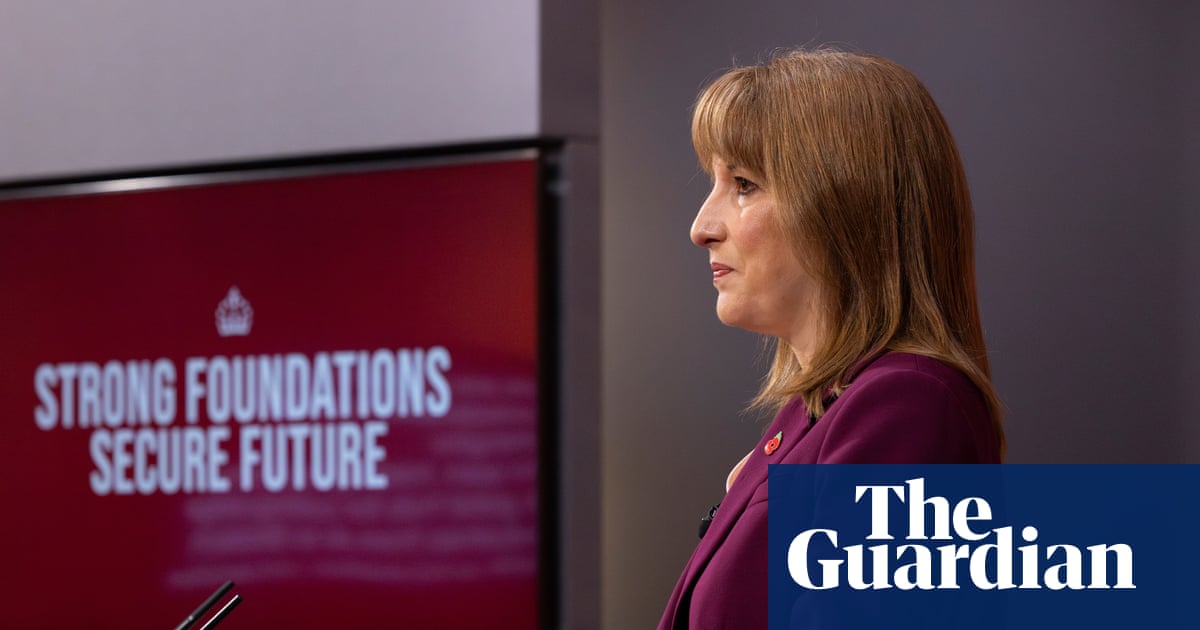
Stronger finances require a stronger economy, but budget tax rises and spending cuts could squeeze activity further
Business live – latest updates
Economy grew by just 0.1% in third quarter amid hit from JLR cyber-attack
Rachel Reeves’s autumn budget is not simple: Britain’s economy is misfiring and things need turning around fast. Yet a fiscal consolidation on the scale the chancellor is expected to require could push in exactly the opposite direction.
The latest figures from the economy are hardly encouraging. Growth slowed from 0.3% in the second quarter to just 0.1% in the third, driven down in part by the cyber-attack on Jaguar Land Rover.
It is a potential doom loop scenario. Stronger public finances require a stronger economy. Yet large tax rises and spending cuts on 26 November could further squeeze activity amid an already weak growth outlook.
In the City, this has bond market investors worried. Yet so too does a budget that would not fully cover an expected shortfall of up to £30bn against the chancellor’s self-imposed fiscal rules. Inflation, currently at almost twice the Bank of England’s 2% target, must also be kept under control.
With growth weak, and confidence fragile amid budget uncertainty, it is clear the government’s No 1 mission to kickstart growth is in trouble. The economy shrank in September and flatlined in August. Real GDP per head – a key measure of living standards – showed no growth in the latest quarter.
Underlying the weakness are factors that are becoming all too familiar: squeezed consumers struggling with sky-high living costs, weak business investment, and a far from supportive global backdrop amid Donald Trump’s erratic trade wars.
In the July to September period consumer-facing services output fell by 0.1%. Despite Labour heralding a pro-business environment – touting billions of pounds of spending committed to Britain at the recent Birmingham regional investment summit – business investment fell by 0.3% in the quarter. It has only inched up by 0.7% in the past year. Export volumes also fell.
Part of the problems for Labour are of its own making. The employers’ national insurance increase in last year’s budget has weighed heavily on hiring and added to costs at a time when companies are grappling with sticky inflation and subdued demand. Meanwhile, continual speculation over the UK’s fiscal position has added to the reluctance among companies and households to spend.
There are, however, some crumbs of comfort.
The cyber-attack on JLR was, hopefully, something of a one-off. Output in the car industry collapsed by 28.6% in the third quarter. Last month, the Bank of England had estimated this would shave about 0.1 percentage points from the quarterly GDP figures. In the end, the figure was bigger: 0.16 percentage points – such is the significance of the UK’s second-biggest car manufacturer to the economy.
JLR had to suspend production at its UK factories for several weeks after being targeted by hackers, with the consequences crippling hundreds of smaller firms in its supply chain across the West Midlands.
Here Reeves can argue the government played an important role in promoting economic resilience, after providing a £1.5bn loan guarantee to JLR to help give the company and its suppliers more certainty. The money was, however, untouched, while JLR took its own steps to pay its suppliers upfront.
Sign up to Business Today
Get set for the working day – we'll point you to all the business news and analysis you need every morning
after newsletter promotion
Zooming out from the third quarter, a slowdown in the second half of 2025 was anticipated by economists. For several years now the UK has exhibited a strong start to a calendar year, and a weaker finish.
Despite the recent slowdown, the UK still remains the fastest-growing G7 economy apart from the US – a position the International Monetary Fund predicts Britain will cling on to next year.
However, the underlying picture is far from rosy. With unemployment at the highest level in four years and inflation likely to have peaked, expectations are mounting for the Bank of England to cut interest rates at its December policy meeting. As much as Britain’s hard-pressed households and businesses, the chancellor will need it amid growing pressure within Labour ranks.
Boxed in ahead of the budget, an expansive package of growth-enhancing tax and spending measures is unlikely. But with the economy in a tight spot, Reeves will need to find a way through this to rebuild confidence when she stands up at the dispatch box on 26 November.